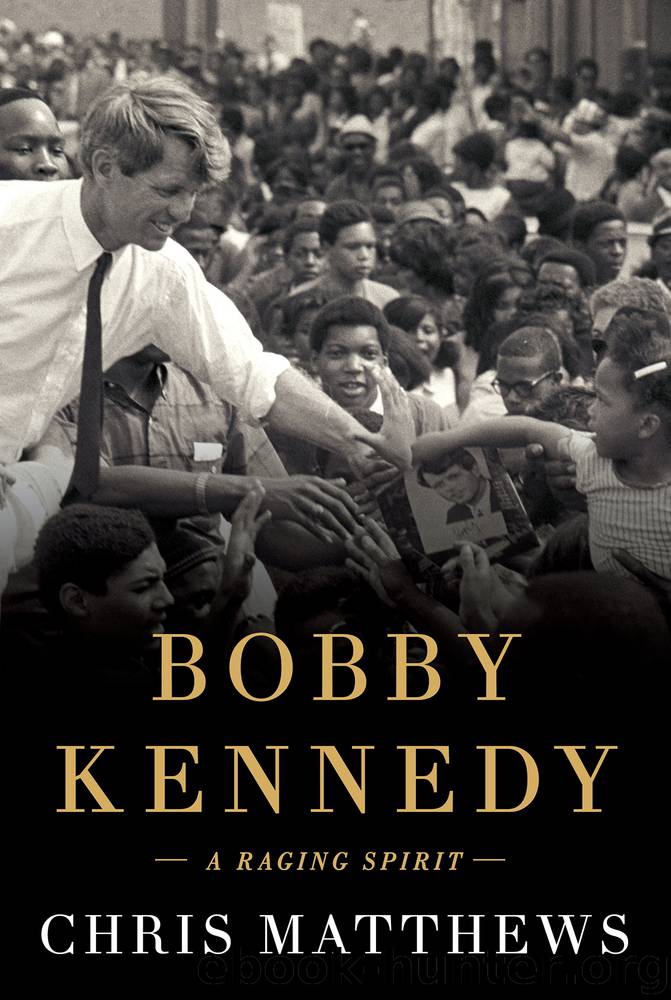Bobby Kennedy by Chris Matthews

Author:Chris Matthews
Language: eng
Format: epub
Publisher: Simon & Schuster
James Meredith registers at the University of Mississippi, October 1962.
CHAPTER FIFTEEN
GENERAL
“He would have taken a bolt of lightning for Jack. All he cared about was his brother’s presidency.”
—JOHN SEIGENTHALER
As he settled into his new office in the Justice Department—six blocks up Pennsylvania Avenue from the White House—Robert Kennedy was having to choose his priorities as the country’s chief law enforcement officer. He soon discovered he still liked “chasing bad guys.”
Surprisingly, J. Edgar Hoover, longtime director of the Federal Bureau of Investigation, was less interested than he in pursuing organized crime. While he relished the FBI’s reputation as tommy-gun-toting “G-Men,” Hoover deployed the greatest number of his special agents shadowing the country’s dwindling number of Communists. He feared that agents would be corrupted by their dealings with the criminal syndicates. Stubbornly, he denied even the existence of a “mafia.”
As Hoover’s superior, Bobby was about to change all that. One of his first acts was to order a list of the country’s top organized crime figures along with strategies for apprehending them. Although the FBI made extensive use of wiretapping and bugging, Kennedy wanted more of it, and more training, all with newer technology.
He also recognized the crime-busting potential of tax records. That was, after all, the route by which the government had brought down notorious mobster Al Capone three decades earlier. His first step was contacting Mortimer Caplin, under whom he’d studied tax law at the University of Virginia. He wanted to know if his former professor believed in the use of tax returns as a legitimate means of establishing criminal activity. Getting the answer he wanted, he went forward with his plans.
“One of the things I’m going to do as attorney general is to take on organized crime in this country,” Bobby told Caplin, whom President Kennedy now named director of the IRS. Accepting the position, and referring to his new boss’s goal, Caplin said he couldn’t emphasize too strongly the importance he attached “to the success of the Service’s contribution to this overall program.”
Jimmy Hoffa remained high on Kennedy’s target list. “From the moment he was named attorney general, Bobby was determined to prosecute Hoffa,” recalled Nicholas Katzenbach, who was running Justice’s Office of Legal Counsel. “He was convinced from his work on the McClellan Committee that Hoffa was evil, corrupt and capable of corrupting our political institutions.” The same was true of Chicago gangster Sam Giancana, the heir to Capone, whom Kennedy saw as “unstable as an animal,” who’d “kill people for kicks.”
But Bobby also found himself engaged by the issue of preventing young criminals from turning into hardened ones. At his first press conference as attorney general, he alluded to the growing problem of juvenile delinquency—a very real social issue, though one J. Edgar Hoover insisted on belittling as “muddle-headed” sentimentalism—and soon made it a department priority. In May 1961, President Kennedy brought into being the President’s Committee on Juvenile Delinquency and Youth Crime, with his brother its chairman and Dave Hackett its director.
There was, as Hackett
Download
This site does not store any files on its server. We only index and link to content provided by other sites. Please contact the content providers to delete copyright contents if any and email us, we'll remove relevant links or contents immediately.
| Africa | Americas |
| Arctic & Antarctica | Asia |
| Australia & Oceania | Europe |
| Middle East | Russia |
| United States | World |
| Ancient Civilizations | Military |
| Historical Study & Educational Resources |
Cat's cradle by Kurt Vonnegut(15320)
Pimp by Iceberg Slim(14476)
4 3 2 1: A Novel by Paul Auster(12362)
Underground: A Human History of the Worlds Beneath Our Feet by Will Hunt(12080)
The Radium Girls by Kate Moore(12011)
Wiseguy by Nicholas Pileggi(5762)
The Fire Next Time by James Baldwin(5421)
Perfect Rhythm by Jae(5390)
American History Stories, Volume III (Yesterday's Classics) by Pratt Mara L(5292)
Paper Towns by Green John(5171)
Pale Blue Dot by Carl Sagan(4992)
A Higher Loyalty: Truth, Lies, and Leadership by James Comey(4944)
The Mayflower and the Pilgrims' New World by Nathaniel Philbrick(4483)
The Doomsday Machine by Daniel Ellsberg(4477)
Killers of the Flower Moon: The Osage Murders and the Birth of the FBI by David Grann(4431)
The Sympathizer by Viet Thanh Nguyen(4381)
Too Much and Not the Mood by Durga Chew-Bose(4324)
The Borden Murders by Sarah Miller(4302)
Sticky Fingers by Joe Hagan(4181)
